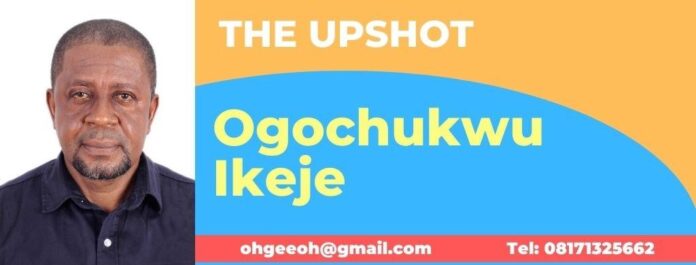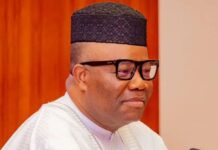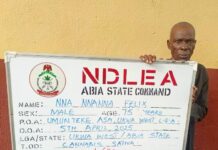We are top of the situation is a familiar phrase by Nigerian presidents, police and military chiefs each time criminals strike and insecurity spikes. When they are not on top of the situation, they are not leaving any stone unturned with a view to bringing “perpetrators of the dastardly act to book”. Will the president please say something new, like, fellow Nigerians, we are finding it extremely difficult solving these security issues?
By Ogochukwu Ikeje
When, on the night of April 14, 2014, Boko Haram men invaded an all-girls secondary school in Chibok, Borno State, and kidnapped 276 girls, one question terrified Nigerians asked was: how did they do it? They came in trucks, it was said later, but how many, and how big were the trucks? And how easy was it to get that many persons on the trucks and drive them away without any challenge in a town where there was a detachment of soldiers during a state of emergency?
It was not the first attack in the northeast, nor was it the bloodiest though a soldier and a police officer were killed in the incident. There were bloodier assaults prior, including the September 29, 2013 attack on a college of agriculture in Gujba in neighbouring Yobe, where 44 boys were reported killed. But the Chibok incident was clearly the most audacious and mindboggling. What did the terrorists want with the girls aged between 16 and 18? To turn them into cooks or sex slaves or articles of trade, as Shekau, the Boko Haram leader at the time, threatened? It shook the entire country, rattled Aso Rock, rallied the international community, and helped to deny Goodluck Jonathan a second term. In fact, Chibok was fuel which Muhammadu Buhari pumped into his campaign machine to blow Dr Jonathan out of town. He was clueless and incompetent, the retired general and his team sang, ceaselessly.
READ ALSO: Remi Tinubu assures hard times will soon fade away
In his turn as chief executive, Gen. Buhari got off to a good start, his men managing to recover territories held by the terror group, but in February 2010 Dapchi happened, at another girls school in neighbouring Yobe. Some 110 girls were taken away. In 2020, in yet another school, at Kankara, in Gen Buhari’s home state of Katsina, armed men struck and took away 500 boys. As in Chibok, Dapchi and Kankara, there were escapees and reported rescues but it was clear that the terrorists had respect for neither a university teacher-turned president nor a retired army general-turned commander-in-chief. Both were humiliated in equal measure. In fact, Shekau once boasted that they would take out Dr Jonathan even as sitting president.
Enter Bola Tinubu. In February 2014, as the Chibok news broke, he tweeted: “Nigeria’s security situation is precarious and Nigerians are tired of excuses and explanations. They want protection for their lives and property.” At a campaign stop in the north, in late 2022, Asiwaju Tinubu declared: “Under my leadership, every inch of our national territory will be secure and defended. We will end kidnapping and banditry.” But barely two months in office, there were over 600 reported killings by non-state actors in the country. In two local councils in Sokoto, for instance, bandits killed 50 farmers for refusing to pay levies. In Benue and Plateau states, there has been no let-up in the slaughter quest. In the north-west, as in the south-east, the picture is the same. In Ekiti State, two traditional rulers were killed recently, a development that drew tears from a House of Representatives member at a plenary session.
What do Dr Jonathan, Gen Buhari and President Tinubu have in common? Excuses, explanations, and the phrase, ‘We are on top of the situation’. At a time, Dr Jonathan lamented that there were members of the terrorist organisation in his cabinet. Was that what parents of the abducted Chibok girls were waiting to hear? Who were those terrorists? Did he deal with them? Dr Jonathan also blamed the Chibok parents for not providing information to police (insult to injury!).
Gen Buhari preferred to thump his chest, saying he had degraded and technically defeated Boko Haram. He should have let Nigerians be the judge. President Tinubu, like his predecessors, is also irritated by criticisms. Last week, former vice president Atiku Abubakar told President Tinubu to step aside if he could not stop the killings. Bayo Onanuga, one of the president’s media aides, shot back at the perpetual presidential hopeful, saying he was still smarting from the defeat at last year’s polls. Then Mr Onanuga added that the president was on top of the situation.
It is a familiar phrase Nigerians hear from their presidents, police and military chiefs each time criminals strike. When they are not on top of the situation, they are not leaving any stone unturned with a view to bringing “perpetrators of the dastardly act to book”. Or the security chiefs are relocating to the crime scene until the criminals are apprehended. It is a well-worn rhetoric. So, will the president do Nigerians a favour and say something new, like, fellow Nigerians, we are finding it extremely difficult solving these security issues. Were this to happen, President Tinubu would have done what his predecessors couldn’t do. He would have made history, albeit a different kind of history. But will he do it? Never!













